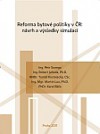Seznam publikací
Hledat publikace podle kritérií
Anebo publikace prohledejte fulltextově
The chapter describes and evaluates the development of both market-based housing finance and social housing finance in post-socialist transition countries.
The chapter describes and evaluates the rent setting and rent regulation in post-socialist transition countries; and development of new demand-side subsidies.
The chapter describes and evaluates the history and recent state-of-art of social housing in the Czech Republic.
The chapter compares the different strategies in social housing in 12 post-socialist transition states, evaluates their overall efficiency and effectiveness, and list the main factors behind the success of different strategies.
The paper aims to show the most common paths to homelessness in the Czech Republic. The theoretical approach applied in this paper attempts to move beyond the structure–agency debate by focusing on the characteristics that most homeless people share on their paths to homelessness. The paper reveals that the pervasiveness of consumer credit has often been a critical juncture on the pathway to homelessness, despite the assistance available from a strong welfare state.
Cílem statě je identifkovat hlavní faktory v pozadí úspěšné reintegrace bezdomovců zpět do dlouhodobých forem bydlení v prostředí ČR, identifikovat hlavní bariéry pro úspěšnou reintegraci a na základě zjištění těchto faktorů a bariér zhodnotit efektivnost stávajících i potenciálních nových nástrojů bytové politiky. Autoři tudíž provádějí i zhodnocení stávajících nástrojů pomoci bezdomovců a potenciál zcela inovativního a nového nástroje v podobě tzv. garantovaného bydlení.
This volume intends to fill the gap in the range of publications about the post-transition social housing policy developments in Central and Eastern Europe by delivering critical evaluations about the past two decades of developments in selected countries’ social housing sectors, and showing what conditions have decisively impacted these processes.
Housing conditions form an important part of social stratification in many advanced industrial economies. The objective of this article is to determine the extent to which social stratification is linked to housing inequalities in the post-socialist Czech Republic; and how this relationship has evolved during the course of the economic transformation process.
This article examines whether housing tenure and regional differences in housing affordability have an impact on labour mobility. This relationship is important for understanding the sources of structural unemployment and impediments to economic growth. Using two sample surveys from the Czech Republic, this research reveals that at the individual level housing tenure is the most powerful factor determining willingness to change residence for employment reasons.
The objective of the paper is to explain one phenomenon evident in the transformation of post-socialist states: the restitution of the housing stock. In the paper, the theory of social constructivism, including Kemeny's advanced application of this theory to the field of housing studies, is used to (a) explain the causes for a particular type of property restitution in the Czech Republic and (b) outline its consequences on the role and long-term social meaning of private rental housing.
The return of property expropriated during the communist period to previous owners or to their descendants (property restitution) led to the quick emergence of a private rental sector in many post-communist countries soon after 1990. This article compares the genesis of private rental tenure in the Czech Republic and Estonia.
The chapter describes and evaluates the progress in social housing in post-socialist transition states, especially from the perspective of social landlords.
The chapter describes and evaluates the changes in housing tenures in post-socialist transition states – especially for rental and owner-occupied housing.
The chapter describes and evaluates the changes in housing policies in Central and Eastern European countries after 1989.
The goal of this paper is to outline the main factors influencing the diverse consequences of the global economic crisis on housing and mortgage markets in two post-socialist economies—the Czech Republic and Hungary. In the former there was a mild decline of markets while in the latter there has been a depression of markets. The paper also contributes to the convergence and divergence debate on housing policies in Europe.
Článek se zabývá problematikou bezdomovství v České republice. Cílem článku je popsat příčiny ztráty bydlení a identifikovat faktory podmiňující úspěšnou reintegraci do společnosti a opětovné získání i udržení si dlouhodobého bydlení.
The goal of this chapter is to briefly describe the social housing system in one of the post-socialist transition countries – the Czech Republic. The aim of the first section is to provide a broader context and history of housing tenure reforms in transition states. The next two sections discuss the social housing institutionalization, particularly in the Czech Republic, for both existing and newly constructed municipal housing.
Publikace se snaží navrhnout změnu vybraných nástrojů bytové politiky ČR za cílem zvýšení její efektivity, efektivnosti, neutrality ve vztahu k různým právním důvodům užívání bydlení a anticykličnosti. Ve druhé části jsou uvedeny výsledky rozsáhlých simulací těchto změn, zejména pak její dopady na veřejné výdaje i distribuci podpor.
Monografie Standardy bydlení 2010/2011 je již pátou v řadě monografií se stejným názvem, ale různým vročením, vydaných Sociologickým ústavem AV ČR, v.v.i.; předcházející monografie byly vydány v letech 2003, 2004, 2005 a 2008.












Facebook
Twitter